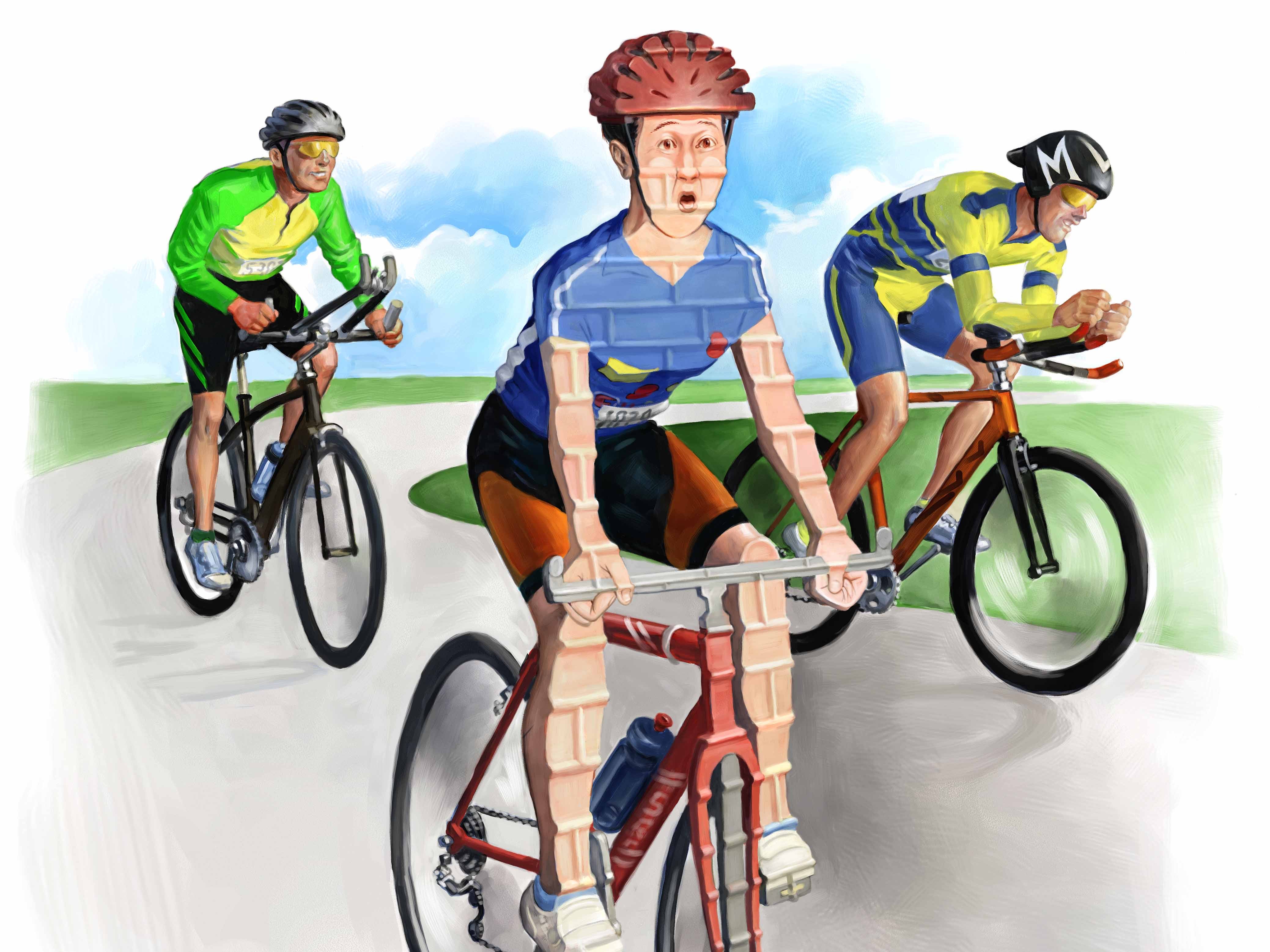Avoid The Dreaded Race Bonk

Illustration by Matt Collins.
Never underestimate your fueling and nutrition needs on the bike (and run), even at a shorter distance.
My 2012 race season culminated with a trip to France for the World Duathlon Championships in late September. I’d spent the summer achieving my very best run and bike fitness to date and was physically prepared for a top-10 age-group placing—or so I had hoped.
I began by running a surprisingly comfortable 38:16 opening 10K, which put me into the top 20 of a highly competitive 45–49 age group. I moved up steadily, while repeating my chosen mantra for the day: “This is so cool, this is so cool, this is so cool!”
With a smooth and swift transition I was on the bike and fired up to tackle a challenging course that seemed custom-designed for my strengths as a roadie.
Through three of five laps, I’d moved into 10th place—easily passing otherwise stronger time-trialers who were struggling through the technically demanding sections. Soon after starting my fourth lap, however, I started to lose focus and my power dropped from the 240 watts I’d been averaging to less than 160 watts. I was a little nauseous while simultaneously feeling really hungry, and could do nothing to stop my race goals from slipping away as I weaved through those final two agonizing laps.
I stumbled through transition and headed out onto the final 5K run, but I was barely able to make a running motion as my hand found the course tape to ensure that I stayed both upright and heading in the proper direction. Forty-one pitiful minutes later I’d achieved the very rare distinction of having covered the closing 5K in more time than the opening 10K. I had bonked spectacularly.
Deconstructing the “bonk”
A bonk is technically the depletion of stored glycogen, which is the primary fuel source for higher intensity exercise. When you “hit the wall,” you are forced to slow significantly to utilize your only remaining fuel source—fat, which requires a far greater presence of oxygen. You can avoid bonking by topping off carbohydrates in the day or two leading up to your event, having a good understanding of how fast and far you can go before depleting your supply, and adequately replenishing carbs during the race. While we burn a mix of carbs (limited) and fat (unlimited) during moderate exercise, most of us will burn nearly 100 percent carbs at the intensity required for a race of this distance or a sprint or Olympic triathlon.
RELATED – Ask A Pro: What Was Your Biggest Nutrition Mistake?
Do the math!
Had I spent a few minutes projecting the caloric burn for my event, the results would have clearly shown that I’d need at least 2,000 calories to reach the finish line at race speed. Even if I were lucky enough to start the race with a full tank of gas (I wasn’t), I’d still be cutting it really close. Then, factor in a solid warm-up and a three- to four-hour fast following breakfast before my 1:10 p.m. start, and I’d surely need 400–600 carb calories during the race: ideally a gel on the start line, a 20-ounce bottle of sports drink on the bike, and perhaps another gel approaching T2—all quite manageable logistically.
Rehearse
Had I been aware of this critical estimation heading into the specific race prep phase of my training, I would have executed workouts designed not only to improve performance at race pace, but also to practice race fueling strategies.
Write it down
I’ve been using a race plan worksheet for years to help my long-course racing, but now I realize the benefits of this tool for shorter distances. Make your own simple worksheet with prompts such as pre-race meals and snacks, race morning breakfast, start line “top off” snack, race pacing, race fuel, hydration, electrolytes, goals (both time- and non-time-based), and anything else you think will best help you to visualize and plan your best race.
RELATED – World Champs Wisdom: Triathlon Lessons From The Pros